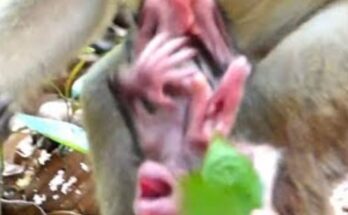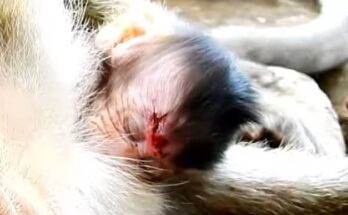Just moments after her birth, tiny baby Anissa entered a world not with love and warmth, but with confusion and pain. Her delicate body, barely strong enough to breathe, was met not by a mother’s embrace, but by rejection. Mother monkey Anna, instead of nurturing her newborn, acted with cold detachment—shoving, ignoring, even harshly pushing little Anissa aside as she cried out weakly. The forest echoed not with joy, but with the soft, heartbreaking sounds of a baby pleading for comfort.
Observers who witnessed the event were left questioning: why would Anna, a mother, behave so cruelly toward her just-born infant? The answer may lie deeper than simple cruelty. In primate behavior, maternal rejection is often complex, driven by stress, fear, or instinct honed by survival.
Anna is not a first-time mother, but she has experienced trauma in previous births. Her last infant didn’t survive long, and some speculate that the emotional toll left her withdrawn and fearful. In wild monkey communities, especially in unstable social groups, mothers can be under immense pressure—threatened by dominant females, struggling with access to food, or fending off aggressive males. Such conditions can lead to mothers distancing themselves emotionally from their offspring, especially if they sense weakness or illness in the newborn.
Anissa, fragile and slower to move than most newborns, might have been seen by Anna as vulnerable or unlikely to survive. In nature, this cruel instinct—disengaging from the weak—can sometimes be a strategy to preserve energy for survival or future offspring. Yet, watching the interaction unfold, one could hardly accept such logic. Baby Anissa tried to crawl toward her mother’s chest, eyes closed, mouth open in silent cries, only to be met with a harsh slap from Anna’s hand. The blow wasn’t meant to injure, but it communicated a clear message: “Stay away.”
Other monkeys nearby seemed uneasy. Some females approached but quickly backed off, knowing Anna’s moods could turn aggressive. One younger female, perhaps moved by pity, crept closer to the crying infant and sniffed her gently before moving away—offering the only moment of softness Anissa had known since birth.
Hours passed, and Anissa lay curled on the ground, covered in dirt, too weak to lift her head. Her mother sat just feet away, grooming herself, ignoring her daughter’s cries. The bond that nature had intended to be automatic was broken.
Whether Anna will eventually soften and allow Anissa back into her arms is uncertain. Some mother monkeys have a delayed bond and accept their young after initial rejection. Others never do.
Anissa’s fate remains unclear, but her first moments tell a tragic story of how instinct, stress, and pain can twist the sacred act of motherhood into something heartbreaking. In the wild, survival doesn’t always look like love—and for Anissa, love may be the very thing she has to fight hardest to find.


